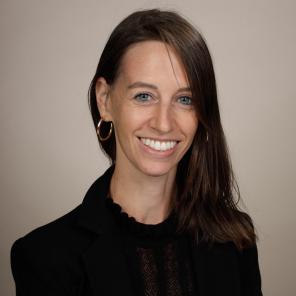
Dr. Linda Sangalli, DDS, MS, PhD, is a dentist as training (University of Brescia, Italy), with a specialization in Orthodontics and a Ph.D. in Technology for Health (Italy). After 10 years of working as a Specialist Orthodontist in Italy and United Kingdom, Sangalli achieved a Master’s in Orofacial Pain at the University of Kentucky. She is currently a Clinical Assistant Professor at Midwestern University, College of Dental Medicine–Illinois where she is responsible for treatment of orofacial pain patients and education of predoctoral dental students in
orofacial pain.
Her main research focuses on artificial intelligence towards orofacial pain and sleep education. For her program, she is leveraging virtual learning environments and telehealth technologies to address gaps in education and access to care. She is also interested in social determinants of orofacial pain and oral diseases, especially based on sex differences. For her research, she received funding from the ADEA Gies Foundation, American Headache Society, the American Academy of Orofacial Pain, the International Association for the Study of Pain, and the American Academy of Dental Sleep Medicine.
Please briefly describe your background and research interests:
I have been originally trained as a dentist, and then further specialized in Orthodontics. However, during my 10 years of private practice as a Specialist Orthodontist, I faced challenges in predicting which of my orthodontic patients would develop orofacial pain signs and symptoms during or after their treatment. This motivated me to pursue a second post-graduate program in Orofacial Pain, with the ultimate goal of understanding the complex mechanisms underlying pain in the face and providing comprehensive care to my patients. Through this program, I realized that dental practitioners are not trained to diagnose or treat orofacial pain conditions, and there is much need of orofacial pain specialists working within predoctoral institutions to shape the education of future dental providers. For this reason, my current main area of research is focused on systems of artificial intelligence (AI) and telehealth to provide continuity of care and enhance education in orofacial pain.
What has been the most valuable benefit of AADOCR membership to you?
During my years of AADOCR membership, I have been actively involved in scientific groups, which have allowed me to build strong relationships of mentorship, sponsorship, and networking.
What impact do you think the AADOCR Mind the Future Program will have on you, either personally or professionally?
My expectations on the AADOCR Mind the Future Program are to build a successful network of colleagues, peers, and mentors that I will refer to in my personal and professional life. I also envision the development of interdisciplinary collaborations on research projects, scientific manuscripts, and future grant submissions as multiple principal investigators or collaborators.
Are you going to next year’s AADOCR Annual Meeting in New York? If so, which parts are you most looking forward to?
I am always looking forward to participating to the AADOCR Annual Meeting. Besides the high-quality level of presentations and symposia, the AADOCR Annual Meeting is an excellent opportunity for building collaborations, networking, developing future research projects, and learning from excellent scientists. The workshops are especially educative, and the broad variety of educational content can fit everybody’s areas of interest and expertise.
What is the best way for other members to become more involved in AADOCR?
Approaching peers or colleagues that are already members, and joining scientific groups and going to their receptions, symposia, and presentations.




